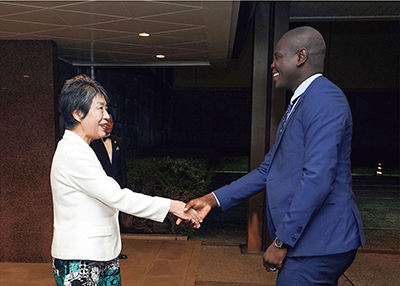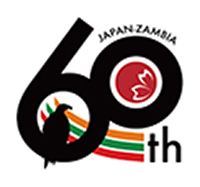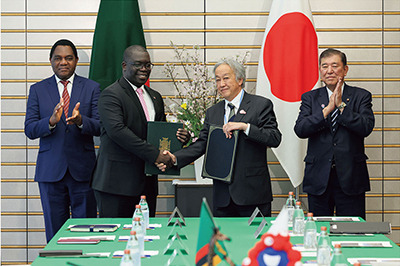Diplomatic Bluebook 2025
Chapter 2
Japan's Foreign Policy by Region
4 Southern Africa
(1) Angola
Angola has a stable political foundation and plays an important role in regional peace and stability through active multilateral diplomacy. The country, which has abundant resources, is working to improve the business environment and promote domestic industries with the aim of diversifying and stabilizing its economy. In July, the Japan-Angola Investment Agreement came into force. In August, Minister of Industry and Commerce Rui Miguêns de Oliveira, who was visiting Japan to attend the TICAD Ministerial Meeting, met with Parliamentary Vice-Minister for Foreign Affairs Fukuzawa and discussed enhancing cooperation with Angola, which will serve as the AU chair in 2025, toward TICAD 9. The two ministers also talked about promoting investment by Japanese companies.
(2) Eswatini
Eswatini maintains the only absolute monarchy in Africa under King Mswati III. It is also the only country in Africa that has diplomatic relations with Taiwan. Deputy Prime Minister Thulisile Dladla, who visited Japan to attend the TICAD Ministerial Meeting in August, met with Foreign Minister Kamikawa, where they shared the view to continue cooperation in areas such as food security and education.
(3) Zambia
In 2024, Zambia, a country with abundant mineral resources such as copper, celebrated the 60th anniversary of its independence and the 60th anniversary of the establishment of diplomatic relations with Japan. In April, Minister of Mines and Minerals Development Paul Kabuswe visited Japan to attend a mining investment seminar. In August, Japan decided to provide an Emergency Grant Aid for food assistance to Zambia in response to the country's food insecurity. In the same month, Minister of Finance and National Planning Situmbeko Musokotwane visited Japan to attend the TICAD Ministerial Meeting, and met with Foreign Minister Kamikawa, where they shared the view to cooperate to further strengthen bilateral relations, including economic relations. In February 2025, President Hakainde Hichilema paid his first official working visit to Japan and held a summit meeting with Prime Minister Ishiba. The two leaders welcomed the signing of the Japan-Zambia Investment Agreement and shared the view to strengthen bilateral relations, including business relations, and deepen cooperation in the international arena.
 Japan-Zambia Summit Meeting (February 6, 2025, Tokyo; Photo: Official Website of the Prime Minister of Japan and His Cabinet)
Japan-Zambia Summit Meeting (February 6, 2025, Tokyo; Photo: Official Website of the Prime Minister of Japan and His Cabinet)(4) Zimbabwe
Zimbabwe is a key location in Southern Africa for transportation, distribution, and power transmission, and is a landlocked country with abundant mineral resources and fertile land. From August, it began serving as the chair of the Southern African Development Community (SADC). Japan has maintained good diplomatic relations with Zimbabwe since its independence in 1980. In March, Japan made the decision to assist with the rehabilitation of the North-South Corridor, which will contribute to Zimbabwe's integration into the regional economy. In August, Japan decided to provide food aid to counter drought. Furthermore, at Japan-Zimbabwe Foreign Ministers' Meeting held during the TICAD Ministerial Meeting in August, Minister of Foreign Affairs and International Trade Frederick Musiiwa Makamure Shava expressed gratitude for the assistance and discussed the stable supply of resources.
(5) Namibia
Following the sudden passing of President Hage G. Geingob in February, power was transferred peacefully to the new president, Nangolo Mbumba. In the presidential election held in November, Vice President Netumbo Nandi-Ndaitwah, candidate of the ruling South West African People's Organization (SWAPO), won.
In August, Japan made the decision to provide food aid through an Emergency Grant Aid to Namibia, which is suffering from serious drought damage. In the same month, Minister of International Relations and Cooperation Peya Mushelenga, who was visiting Japan to attend the TICAD Ministerial Meeting, met with Foreign Minister Kamikawa where they confirmed that they would strengthen cooperation in a wide range of fields toward industrial diversification.
(6) Botswana
Botswana held a general election on October 30, and the opposition party, Umbrella for Democratic Change (UDC), won a majority in the National Assembly election, with UDC leader Duma Gideon Boko taking office as the new president on November 8. This was the first change of government since Botswana's independence in 1966, but both the electoral process and the transition of power were carried out democratically and peacefully in accordance with the provisions of the constitution.
In August, Minister of Foreign Affairs Lemogang Kwape visited Japan to attend the TICAD Ministerial Meeting and held a bilateral meeting with Foreign Minister Kamikawa, in which they confirmed that they would promote cooperation in the areas of industrial diversification and human resource development, which are priorities for Botswana.
(7) Malawi
Malawi has maintained stable domestic affairs since its independence in 1964. Japan has built friendly relations with Malawi over many years, with which it shares fundamental values and principles. To mark the 60th anniversary of the establishment of diplomatic relations, Japan invited Minister of Foreign Affairs Nancy Tembo to Japan as a guest of the ministry in August. Foreign Minister Kamikawa met with Foreign Minister Tembo and the two shared the view to continue to cooperate in various fields, such as human resources development in the mining sector and further enhancing friendly relations through JICA volunteers, of which the largest cumulative number in the world have been dispatched to Malawi.
 Japan-Malawi Foreign Ministers' Meeting (August 24, Tokyo)
Japan-Malawi Foreign Ministers' Meeting (August 24, Tokyo)(8) South Africa
In the general election held in May, the ruling African National Congress (ANC) received less than half of the votes for the first time since 1994, leading to the establishment of a Government of National Unity (GNU) with other parties. Under the reappointed President Matamela Cyril Ramaphosa, the country has served as the G20 chair since December, and continues to attract interest from foreign companies, including Japanese, as an economic powerhouse in Africa, as well as a base for expanding business operations. In July, JMSDF's training ships made a port call at the country, and the two countries conducted friendly training drills. In August, Foreign Minister Kamikawa met with Minister of International Relations and Cooperation Ronald Lamola during the TICAD Ministerial Meeting, where the two countries affirmed to strengthen bilateral relations and cooperate in the international arena. In December, Minister of Electricity and Energy Kgosientsho Ramokgopa visited Japan to strengthen cooperative relations in the energy sector, including hydrogen, ammonia, and electricity.
 Japan-South Africa Foreign Ministers' Meeting (August 23, Tokyo)
Japan-South Africa Foreign Ministers' Meeting (August 23, Tokyo)(9) Mozambique
Mozambique is a strategic location facing FOIP from the west as the gateway to Southeast Africa, and development by foreign capital is progressing against the backdrop of the country's abundant natural resources such as natural gas, coal, and graphite. Due to continuing attacks by armed groups in the north, a liquefied natural gas (LNG) development project in which Japanese companies have been participating has been suspended since 2021. The Government of Japan continues to provide various forms of support to improve security. In March, the two countries confirmed the importance of working together to advance multifaceted development that will lead to the stabilization of Cabo Delgado Province and growth of the entire northern region by using the Co-creation for common agenda initiative, a first for Africa, and shared the view to continue coordinating efforts to realize this. In August, Deputy Minister of Foreign Affairs and Cooperation Manuel José Gonçalves visited Japan to attend the TICAD Ministerial Meeting, where he met with Deputy Minister for Foreign Affairs Tsuji and expressed his gratitude for Japan's cooperation in improving security in the north and for Nacala Port, which opened in October of the previous year. The two sides agreed to continue cooperation in various fields, including energy.
(10) Lesotho
Lesotho is a landlocked country with most of its land mass being mountainous. It has abundant water resources, and exports water to neighboring countries. Japan has also built cooperative relations in various fields, including providing support for the country's small hydroelectric power generation facilities. In August, Foreign Minister Kamikawa held a meeting with Minister in the Prime Minister's Office Limpho Justice Tau, who was visiting Japan to attend the TICAD Ministerial Meeting, where they confirmed that bilateral relations would be strengthened through the promotion of renewable energy, human resource development targeting young people, food security, the blue economy, and other areas.
In 2024, Japan and Zambia celebrated the 60th anniversary of the establishment of diplomatic relations. Zambia is a landlocked country in southern Africa that borders eight neighboring countries. Since its independence, it has maintained a stable political system and has come to be known as the “Beacon of Peace” in southern Africa. It is also known for its beautiful nature and abundant mineral resources, such as copper. In particular, Victoria Falls, located on the border with Zimbabwe and registered as a World Heritage Site, captivates visitors with its grandeur. Zambia is also known for its national parks, which are home to a diverse range of wildlife, and for being a country where traditional culture coexists with modern cities.
The friendly relations between Japan and Zambia began coinciding with Zambia gained independence in 1964. That year, the Tokyo Olympics were held in Japan, and Zambia participated under its then name of Northern Rhodesia. The closing ceremony of the Tokyo Olympics was held on October 24, the day Zambia resoundingly declared its independence, and the brand new Zambian flag was hoisted on the international stage for the first time, creating a historic moment that is unique in Olympic history.
Japan has engaged in a wide range of cooperation in numerous fields to support Zambia's economic and social development. In particular, the School of Veterinary Medicine at the University of Zambia, which was completed in 1986 with assistance from Japan, has served as a flagship symbolizing the friendly relations between the two countries. To date, over 200 researchers from Hokkaido University have provided training and instruction there, while students from the University of Zambia have visited Japan to obtain degrees, etc.
Numerous commemorative events were held across both countries in 2024 to mark the important milestone of the 60th anniversary of the establishment of diplomatic relations, promoting mutual understanding and deepening friendly relations between Japan and Zambia. Examples of these include the overseas traveling exhibition “NINGYO: Art and Beauty of Japanese dolls” organized by the Japan Foundation (JF) and the photo exhibition “60 Years of Cooperation and Friendship, From Japan to Zambia” organized by the Japan International Cooperation Agency (JICA), both held at the Lusaka National Museum in Zambia.
 Special performance by the Japanese drum (wadaiko) group “SAI” (September 3, Lusaka, Zambia)
Special performance by the Japanese drum (wadaiko) group “SAI” (September 3, Lusaka, Zambia)Among these, the performance in Zambia by the Japanese drum (wadaiko) group “SAI”1 was an important large-scale cultural event that further strengthened the friendly relations between the two countries. From August 31 to September 3, the group performed powerful, rhythmic and dynamic Japanese drum performances to a total audience of approximately 3,200 people at four venues, and at each venue, the standing audience gave them thunderous applause. Such cultural exchange events not only helped to bring the people of Japan and Zambia closer together but also laid the foundation for building even stronger friendly relations.

 Presentation of the signed investment agreement at Japan-Zambia Summit Meeting (February 6, 2025, Tokyo; Photo: Official Website of the Prime Minister of Japan and His Cabinet)
Presentation of the signed investment agreement at Japan-Zambia Summit Meeting (February 6, 2025, Tokyo; Photo: Official Website of the Prime Minister of Japan and His Cabinet)In addition, the commemorative logo selected from among many entries was based on the colors of the two countries' flags and features Zambia's national bird, the African fish eagle, and Japan's national flower, the cherry blossom. It beautifully weaves together symbols of the nature, strength, and culture of both countries, embodying the pride and gratitude for the past, present, and future partnership between Japan and Zambia.
Furthermore, President Hakainde Hichilema paid his first official working visit to Japan from February 3 to 7, 2025. President Hichilema held a summit meeting with Prime Minister Ishiba, and the two leaders shared the view to further strengthen economic relations and enhance cooperation in the international arena. During the president's visit to Japan, he met with His Majesty the Emperor at the Imperial Residence. President Hichilema also attended the Japan-Zambia Business Forum and visited Japanese companies. The visit was also an opportunity to sign the Japan-Zambia Investment Agreement, providing momentum for further strengthening bilateral relations in light of the 60th anniversary of the establishment of diplomatic relations in 2024.
- 1 For more information on the 60th anniversary events taking place in Zambia, including this performance, please visit the official Facebook page of the Embassy of Japan in Zambia (updated regularly): https://www.facebook.com/JAPANinZAMBIA/?locale=ja_JP


